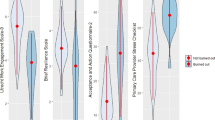Abstract
Background
Stress and burnout are common among doctors. Excess levels of stress have been shown to have detrimental personal and professional effects as well as a negative influence on patient care.
Aim
The aim of our pilot study was to assess the levels of burnout among a cohort of interns.
Methods
A voluntary written self-assessment of burnout levels was distributed to interns in two teaching hospitals. The Maslach Burnout inventory is a 22-question survey assessing the three components of the burnout syndrome—emotional exhaustion (EE), depersonalisation (DP) and personal achievement (PA).
Results
Twenty-seven surveys were distributed to interns in two hospitals with a 96.3 % (n = 26) response rate. The mean age was 25.1 years (range 24–31 years). 14 were medical interns, 12 were surgical interns at the time of completion. Overall, the mean EE score was 23.4 (range 11–29), representing moderate levels of EE. The mean DP score was 9.4 (range 4–14), representing moderate levels of DP. The mean PA score was 18.9 (range 12–29), representing high levels of PA. There were no significant differences noted between levels of EE, DP or PA among male or female interns, medical or surgical interns or those who worked in a peripheral or university hospital.
Conclusion
Burnout is reported among interns in our pilot study. Measures need to be taken to heighten awareness of burnout among doctors and to educate physicians regarding self-awareness and personal health.




Similar content being viewed by others
References
Cuesta JM, Singer M (2012) The stress response and critical illness. A review. Crit Care Med. 40(12):3283–3289
Wetzel CM, Kneebone RL, Woloshynowych M et al (2006) The effects of stress on surgical performance. Am J Surg 191(1):5–10
Sevdalis N, Forrest D, Undre S et al (2008) Annoyances, disruptions, and interruptions in surgery: the Disruptions in Surgery Index (DiSI). World J Surg 32(8):1643–1650
Flin R, O’Connor P, Crichton M (2008) Safety at the sharp end: a guide to non-technical skills. Ashgate, Aldershot
Hassan I, Weyers P, Maschuw K et al (2006) Negative stress coping strategies among novices in surgery correlate with poor virtual laparoscopic performance. Br J Surg 93(12):1554–1559
Maslach C, Jackson SE (1986) The measurement of experienced burnout. J Occup Behav. 2:99–113
Blanchard P, Truchot D, Albiges-Sauvin L et al (2010) Prevalence and causes of burnout amongst oncology residents: a comprehensive nationwide cross-sectional study. Eur J Cancer 46(15):2708–2715
Dyrbye LN, Thomas MR, Massie FS et al (2008) Burnout and suicidal ideation among US medical students. Ann Intern Med 149(5):334–341
Prins JT, Hoekstra-Weebers JE, Van de Wiel HB et al (2007) Burnout among Dutch medical residents. Int J Behav Med. 14:119–125
Dudley HA (1990) Stress in junior doctors. 1 stress and support. BMJ 301(6743):75–76
Cordes CL, Dougherty TW (1993) A review and an integration of research on job burnout. Acad Manag Rev. 18(4):621–656
Maslach C, Schaufeli WB, Leiter MP (2001) Job burnout. Annu Rev Psychol. 52:397–422
Trufelli DC, Bensi CG, Garcia JB et al (2008) Burnout in cancer professionals: a systematic review and meta-analysis. Eur J Cancer Care (Engl) 17:524–531
Lyckholm L (2001) Dealing with stress, burnout, and grief in the practice of oncology. Lancet Oncol. 2:750–755
Mount BM (1986) Dealing with our losses. J Clin Oncol 4:1127–1134
Parker PA, Kulik JA (1995) Burnout self- and supervisor-rated job performance, and absenteeism among nurses. J Behav Med 18(6):581–599
Gundersen L (2001) Physician burnout. Ann Intern Med 135(2):145–148
Siegrist J, Shackelton R, Link C et al (2010) Work stress of primary care physicians in the US, UK and German health care systems. Soc Sci Med 71(2):298–304
Grunfeld E, Whelan TJ, Zitzelsberger L et al (2000) Cancer care workers in Ontario: prevalence of burnout, job stress and job satisfaction. CMAJ 163(2):166–169
Rogers C, Malone KM (2009) Stress in Irish dentists: developing effective coping strategies. J Ir Dent Assoc. 55(6):304–307
Meltzer H, Griffiths C, Brock A et al (2008) Patterns of suicide by occupation in England and Wales: 2001–2005. Br J Psychiatry 193(1):73–76
Agerbo E, Gunnell D, Bonde JP et al (2007) Suicide and occupation: the impact of socio-economic, demographic and psychiatric differences. Psychol Med 37(8):1131–1140
Conflict of interest
None.
Author information
Authors and Affiliations
Corresponding author
Rights and permissions
About this article
Cite this article
Nason, G.J., Liddy, S., Murphy, T. et al. A cross-sectional observation of burnout in a sample of Irish junior doctors. Ir J Med Sci 182, 595–599 (2013). https://doi.org/10.1007/s11845-013-0933-y
Received:
Accepted:
Published:
Issue Date:
DOI: https://doi.org/10.1007/s11845-013-0933-y




